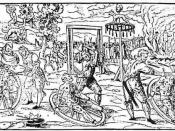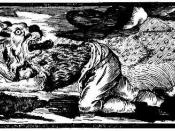"Lycanthropy... 1 : a delusion that one has become a wolf 2 : the assumption of the form and characteristics of a wolf held to be possible by witchcraft or magic," (Webster's). Today, the idea of humans transforming into animals seems absurd. No sane person could ever believe such fairy tales of times long gone. In 16th century Europe, however, the belief was widespread. Accompanying the wave of satanism that swept Europe after the Middle Ages, a fear of werewolves influenced many aspects of life. Werewolves were believed to roam the countryside, searching for victims to quench their bloodthirsty desires. How did lycanthropy influence the crime and literature of 16th century Europe? An outbreak of werewolf-related crime began: numerous murders occurred, by people who truly believed they were werewolves, and outlaws and bandits took advantage of the widespread fear and dressed as wolves to frighten their victims. At the same time, werewolves appeared throughout European literature, fictional and otherwise.
The notion of werewolves had taken root in European society.
During the 16th century, Europeans were unusually prone to the delusion that they were werewolves. As a result, an overwhelming number of people were brutally murdered, in addition to those who were executed for suspected lycanthropy. Nearly 30,000 people were convicted for lycanthropy in France alone between 1520 and 1630 (Werewolves). One of the more renowned lycanthropes was Peter Stubbe, who was executed in 1591 (Steiger, 46). Many people living in Cologne and Bedburg, Germany had been lost to supposed wolf attacks, but when one wolf was cornered, it stood up and became a man known as Peter Stubbe. When put on the torture wheel, Stubbe confessed to the murders of thirteen children and two pregnant women. Stubbe's case of lycanthropy resulted from an early fascination with satanic sorcery-...


